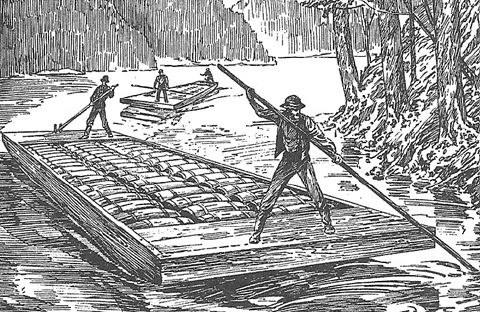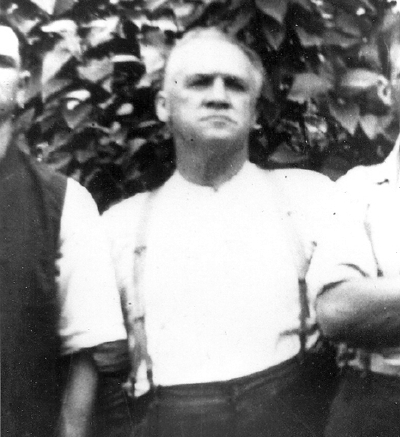JIM HAUGHT - MOON SHINING IN CALHOUN COUNTY

Flatboats loaded with whiskey proceeding down a West Virginia River
By Jim Haught
Lemuel Laughlin lived on Rush Run in southern Calhoun County. Lem was a well-known moonshiner. The Revenue Officers were constantly trying to catch him selling his whiskey. Lem seldom used the words moonshine or whiskey. He referred to his product as "tea." He often packaged his moonshine in quart jars.
One time in Spencer a revenue officer came up to Lem and said. "Can you sell me a quart of tea?" Lem handed the officer a quart jar filled with a brown liquid. The revenue officer arrested Lem. "Take a drink of your tea" said Lem. The officer did and found out it was really tea.
Making alcohol from corn was a very logical activity for early settlers to the area that is now Calhoun County. Corn was a logical crop but getting grain to market became difficult. If the farmer converted the corn to alcohol it was easier to transport and it sold for more money.
Whiskey was one of the first substances taxed by the U.S. Government. Farmers in Western Pennsylvania refused to pay the tax. President George Washington led a military unit to put an end to the "Whiskey Rebellion" in 1791.
Alcohol (moonshine) was shipped out of what became West Virginia on barges. It traveled down the Monongahela, Little Kanawha, Great Kanawha, and Guyandotte Rivers. At various ports, Cincinnati, St Louis, New Orleans it was sold to the highest bidder. The barge was also sold for its lumber. The raft men then walked back home.
Moonshine was usually made with sugar, yeast and corn. This was put in warm water and permitted to ferment for about two weeks. The next step was distillation. The still was usually a large kettle attached to coils. The mash was heated. The alcohol boiled off first.
It was cooled with water and collected. The first to come off was like aviation gasoline. This was thrown away. The next was collected. One continued collecting but finally what came off was water. The strong alcohol and the weak were mixed together. The good moonshiner knew when to start collecting and when to stop.

Marlan W. Hoskins, Arnoldsburg, WV
My great grandfather, Marlin Hoskins made a special beverage that he called "Julep." He would put corn in a burlap bag and wet it with warm water. He placed this in the dark for about 10 days. When the sprouts were about ¼ inch long he put them in a stone jar and mashed them thoroughly.
Next he added 5 gallon of boiling water. When it cooled he added yeast and often malt. He let this ferment for 7-10 days then straining it through a pillow case to remove all solids. The beverage was more like beer.
In 1920 the U.S. Congress passed the Volstead Act (18th Amendment) which made the sale, production, importation and transportation of alcoholic beverage illegal. The price of all alcoholic beverages, although illegal, shot up. One could make money producing and selling alcohol.
My father, Horace L. Haught, knew his neighbor, Lemuel Laughlin. Lemuel was a fine young man who married Amanda Starcher and raised a family. To make a little extra money he distilled whiskey and bootlegged it mainly in Calhoun, Roane, and Jackson Counties.
Another story that was told about Lemuel's bootlegging occurred in Grantsville. Again a revenue officers were trying to catch Lem red handed. He approached Lem and said he would like to buy a quart of "tea." Lem told the revenue officer to give him $10.00 and he would go get the tea. The officer said.
"How do I know that you will just take my money and leave?" Lem said. "I just bought a new pair of shoes over at Wyiant-Barr Store. You hold them as collateral until I get back." Lem left and never came back. The Revenue Officer opened the shoe box and found a quart of moonshine.
Moonshining and bootlegging finally caught up with Lemuel Laughlin. The authorities finally caught him and put him in jail in Ripley, Jackson County, WV. Lem was charged with every "unsolved" crime imaginable . Lem Laughlin was used to being a free man. He couldn't take being pinned up in an 8x8x8 cell. He hung himself in 1920.
With the election of Franklin D. Roosevelt and a Democratic Congress in 1932 the 18th Amendment was repealed. Although making some moonshine continued in southern Calhoun County it ceased to be profitable.
I am giving you this information to clue you in on some of the history of Calhoun County. I hope you will not take the information and try to make some moonshine whiskey.
I'll relate one more story to show you why you should not make moonshine. I tried it. I secured a 10 gallon stone jar and fitted it with a lid. Adam Schoolcraft, a neighbor, mixed my mash. I then made a still using a new five gallon oil can. The coils were made of copper pipe bent around a six inch post. Everything was set up, ready to go.
Our neighbor, Mrs. Perkins, used water out of the stream where I was getting my water. There was not a good flow of water so she started up the hollow releasing pools of water. She came upon my still. Since Mrs. Perkins didn't have a telephone she came to our house to call the State Police.
The police came right away. They went up the hollow and confiscated all of the moonshine making equipment. They came back to our house to discuss leads. The policeman looked over at me sitting in a wheelchair with my leg in a cast. He said. "We can disregard you because there is no way you could get up in that hollow.
I breathed a sigh of relief and said a brief prayer of thanks.
See JIM HAUGHT: PROHIBITION CREATED "BAD MOONSHINE" IN SUNNY CAL